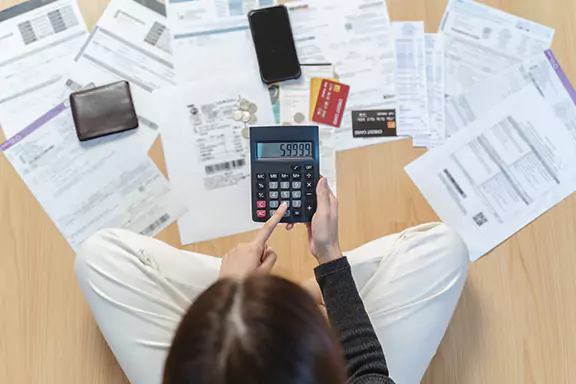Refinancing credit card debt is the process of obtaining a new loan to pay off existing loans. The benefit of this is often to take high interest rate credit card debt and refinance it into a loan with lower interest rates. That could help you to save money.
Keep in mind that this type of debt consolidation still expects that you will continue to make payments on time, but instead of paying the current lender, you will pay the new lender. A debt consolidation loan like this can offer a variety of benefits to those who may need some help pulling out of credit card debt.
How Does Credit Card Refinancing Work?
Credit card refinancing involves obtaining a new credit card or line of credit that is large enough to pay off the other loans you have. This allows you to transfer the debt from multiple credit cards to just one new credit card or debt consolidation loan.
There are several routes you can take to consolidate and refinance your credit, and now all of them are equal.
Balance credit card transfers
A balance credit card transfer is just what it sounds like. You will open a new credit card that allows you to transfer the balance of your current credit cards to the new one. Come balance transfer credit cards offer an intro period where the annual percentage rate (APR) is 0% or very low. That could help you to save money while you work to pay down the loan.
In this option, the current lines of credit you have, such as your current credit cards, stay open. You’ll need to be careful not to use those balances again, or you could double what you owe to lenders. You will need to qualify for the balance transfer credit card, too, which can be hard for some people. There could be a balance transfer fee with some lenders. Also, note that not all balance transfer cards offer a low interest rate (and that could end up costing you in the long run).
Debt consolidation loans
Another option is to use a debt consolidation loan through a bank or credit union. These loans may be available through specialized lenders as well. They do not work like a credit card but rather are a lump sum of money you receive to use to pay off all of your individual credit cards. With these credit card loans, you end up with one larger payment to make each month. Your existing credit cards are not necessarily closed either.
These are personal loans. If they are an unsecured personal loan, as many are, that means there is no collateral being used for them. That can make this type of credit card consolidation loan harder to qualify for if you have a low credit score. However, if you do qualify, they can help you build your credit history if you make payments on time.
Home equity loans or refinancing
Another route to consider is to use your home’s equity (the portion of value it has that is above and beyond what you owe on the home through your lender). You may be able to secure a home equity loan at a very low interest rate. You can use those funds to pay off your existing credit cards. The benefit of these loans is that they tend to have very low interest rates compared to most credit cards.
Keep in mind that you are also putting your home on the line. If you do this and then fail to make payment on your home equity loan or line of credit, the lender may decide to seek foreclosure to recoup their losses.
Nonprofit debt consolidation
These are not necessary credit card consolidation loans. Rather, you will work with a nonprofit credit counseling agency that will help you create a single payment plan. You will pay the agency a fixed dollar amount each month, and they will work with your lenders to keep costs low.
Keep in mind that this type of credit card consolidation can carry some risks to your credit score. While it will make it easier for you to pay multiple debts, your credit cards will be closed, and you will no longer have access to them. More so, you will not be meeting the lender’s original terms, which means this could hurt your credit score. The key benefit of this type of debt consolidation is that your monthly payment is likely much lower, and you will be able to get your loans caught up sooner.

What Are the Benefits of Credit Card Debt Consolidation?
The question is, why use this type of loan for credit card debt management? There are several core benefits that can occur when you consolidate credit card debt.
Lower interest rate
The most common reason to consolidate credit card debt is that it will allow you to qualify for a lower interest rate. Some loans have an introductory period where the interest rate will be very low (even 0%). If you pay off the loan during that time, interest payments are eliminated for you (saving you a lot of money and potentially helping you to get out of debt faster).
Improve your credit score
In some situations, you may be able to see improvement in your credit score if you use this method. Credit scores can improve if you make payments on time and work to reduce your overall debt. Also, because this is a new loan, it improves your credit utilization ratio, which makes you look good to lenders.
Lower monthly payments
If you take your existing debt and fold it into one new lump sum loan, you may be able to have a lower monthly payment than if you continued to make monthly payments to each of your credit card companies. With one monthly payment (and often a very affordable monthly payment), you may be able to make payments more reliably and even pay off debt faster.
Who Should Consider Credit Card Refinancing?
There are many benefits to credit card refinancing possible. You may wish to consider it in several situations:
You want to refinance credit card debt to get a lower interest rate.
You want one monthly payment that is more affordable to you.
Your credit card balances are approaching their credit limit, and you are struggling to pay them down.
You want to improve your credit score by making monthly payments on time and by extending your available credit.
Your current high-interest credit cards are costing you a lot of money in interest payments alone.
You sometimes miss a credit card bill, and that is hurting your credit score.
You need help with debt management plans that may be able to help you get out of debt.
In all of these situations, it can be beneficial to pursue a way to pay off your existing credit card balances with a new personal loan, balance transfer credit card, or even through the help of a debt management plan. Yet, when you refinance credit card debt, you still have to pay that debt back, and that means that you will need to carefully create a budget and work to pay down your loan over time.


